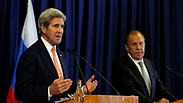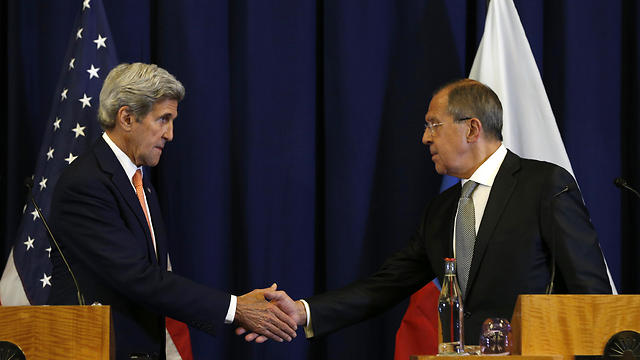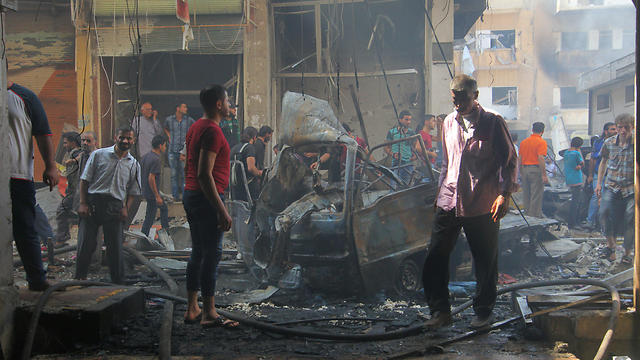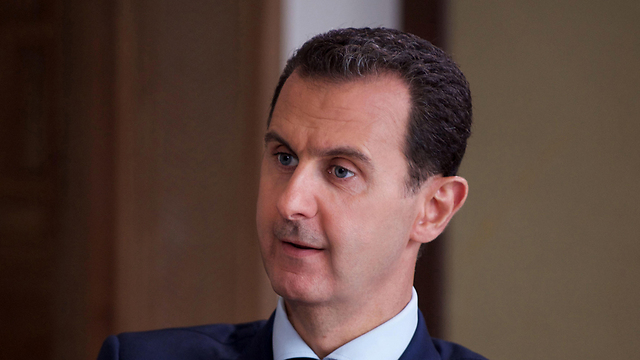The thundering silence coming from Israel in the wake of the Syria truce agreement, signed between the US State Department and the Russian Foreign Affairs Ministry, echoes a great deal of skepticism. This is because Israel does not believe that this agreement will be implemented, excluding perhaps local ceasefires and temporary windows allowing for humanitarian aid.
It is true that the current agreement is not in Israel's best interests: the agreement itself is constructed as a temporary solution that could lead to a permanent one, in which Syrian President Bashar Assad and Iran remain the dominant forces within Syria, with the Iranians now poised in the Golan Heights. But since people here don't believe that the war in Syria will end within the next year or two, Israel is maintaining the option to make some noise or intervene in case it is clear that we will be dealing with a real emergency.
The chance of this agreement actually being carried out lies in the details of the clandestine documents that both world powers refuse to disclose. And yet, despite the secrecy concerning its details, it is clear that there is much that both should be ashamed of in this agreement, as they are harming their allies' interests both in our region and in Europe. There are even officials within the US government who view it as an unstable agreement.
At the heart of the internal US conflict surrounding the ceasefire is a disagreement between the Pentagon and the State Department regarding the strategic assets and interests that were given to Russia in exchange for its coming onboard. These include betraying the Syrian Kurds, who are supported by the US armed forces and have been carrying out their biddings.
Secretary of State John Kerry, who has been trying to eke out a strategic advantage in the remaining time left to the Obama administration, is selling out the Kurds to the Turks and in the process may—to the horror of the Pentagon—lose their cooperation.
It remains unclear whether the agreement also includes a Turkish commitment of a ceasefire. The Turks have yet to complete their own military operation, so they have no reason to join the ceasefire. Continued Turkish attacks against the Kurds mean continued war in Syria. Nobody is talking about future Kurdish rights, and if that doesn't appear in the agreement—there won't be a truce.
Kerry and Russian Foreign Minister Sergey Lavrov put on a positive front during their joint press conference, with what appeared to be a real desire to change the reality in Syria. But in order not to clash with their European and Arab allies, they've kept the specifics of what will become of Assad's regime if the ceasefire were to succeed a secret. Does it state that Assad will remain in power for the first six months while an interim government is put in place following the end of the battles? Will he agree to appoint two deputies from his opposition to share in his authorities, as was agreed with the Russians? Will he be allowed to take part in the elections, or will he be forced to resign and disappear? All this remains unclear.
Kerry and Lavrov announced that Syria will no longer be permitted to deploy its air force, and that only the US and Russia's air forces will be allowed to strike down ISIS. This seems unlikely, given the fact that ISIS is still carrying out suicide bombings against Syrian targets. In addition, it seems that Assad himself feels as though the tide is changing, and that he is close to defeating the rebels and completely restoring his rule. He is not going to stop midway.
It is likely, however, that Assad and Russia's willingness to enter into a ceasefire agreement is also due to new international pressure over Assad's use of chemical weapons. The UN has come to realize that Assad has been hiding two percent of all the chemical warfare at his disposal, considered to be a substantial amount. Lately, Assad's been attempting a relatively clever maneuver, producing chemical substances that do not appear on the UN treaty.
The agreement coming out of Geneva is looking less and less like something that is going to bring about a proper end to the conflict in Syria and more like a Russian-American attempt to increase their chances of defeating ISIS and the Nusra Front. Both super powers have agreed to tighten their cooperation when fighting ISIS, and to do this, they need the nearby fronts to remain quiet. This is why they have approached the "legitimate" rebels in Syria and told them to get out of ISIS and Nusra Front-held areas, allowing the US and Russia to operate in these regions without interference.
In any case, though, it is clear to all the parties involved that there is no chance to reach an agreement in Syria until after the elections in the US and Iran have been decided.





















